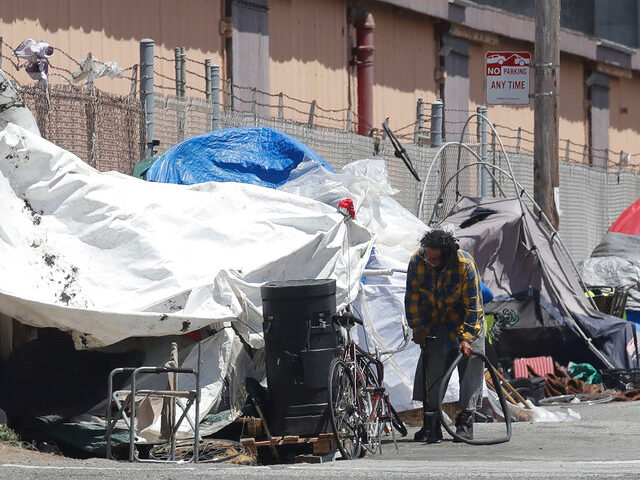Landlords and residents in California’s Bay Area are being asked to take in vagrants as homelessness continues to spiral out of control.
Several nonprofits and a mayor in the area are prodding residents and landlords to take in one of the nearly 30,000 homeless individuals in the five-county area, the Mercury News reports. Existing affordable housing developments do not have adequate room to accommodate the homeless population.
The nonprofit Safe Time in East Bay works to place homeless college students and families into residents’ spare bedrooms for up to a six-month period.
“This is something that someone can do when they just feel that despair of ‘oh my gosh, I just can’t stand seeing these poor people on the streets near my home,'” the nonprofit’s director, Christi Carpenter, told the Mercury News. Since 2017, the organization has placed upwards of 60 people – a far cry from the tens of thousands living on the streets.
Zach Stein and his wife took in a struggling young woman through the program in 2020, allowing her to stay in a spare bedroom, according to the Mercury News. “In some ways, it was really weird,” Stein said.
The couple recently had a baby and is open to taking in another homeless person in the future. They were able to purchase their home after receiving an inheritance and aim to share the “good luck” with those struggling, the Mercury News reports.
“Being in a position to do that, especially in a place like the Bay Area,” Stein told the outlet. “It felt really important to us to find ways to open that up.”
Richmond Mayor Tom Butt (D) is working with the Rotary Club to pair vagrants with landlords who will take them in, the Mercury News reports. “The small program will be funded entirely by private donations, and landlords will get one year’s rent in advance,” the outlet writes.
“That’s the carrot,” Butt told the Daily Mail, noting landlords would be paid the market rate.
“But we have had some landlords come forward and offer it lower, as they want to participate,” the mayor added.
The Mail asked Butt if residents expressed safety concerns when it comes to welcoming a homeless person into their home or property. Butt’s response was that residents’ worries regarding homeless people’s struggles supersede safety concerns, the outlet reports.
“They are more concerned with the homeless camps,” he said. “People want to see solutions, and want to be part of the solution.’
Another nonprofit, the Homecoming Project, houses former prisoners. “Using donations, the nonprofit pays hosts in Alameda and Contra Costa counties $30 a day to house someone in a spare bedroom for six months,” the Mercury News reports. “Each former inmate is matched with a case manager to help them find a job and save money for a permanent home.” The organization does not house sex offenders.
The Homecoming Project has placed 70 former inmates in homes, none of whom have gone back to jail or prison, according to the Mercury News.
On Thursday at 3:00 p.m. San Francisco’s Department of Homelessness and Supportive Housing will host a seminar to urge landlords to rent to homeless individuals. The local government will foot the bill, the Mail reports.
The seminar comes as an estimated 8,000 in San Francisco are homeless, which is up from the estimated 5,600 a decade ago.
Richie Greenberg, the only Republican to run in San Francisco’s 2018 mayoral election, called the plans both “unrealistic” and “creepy” while speaking with the Mail.
“The sheer number of people, and the reasons behind them being homeless, means it won’t have an impact,” Greenberg said. Instead of such programs, the former mayoral candidate says there is a need for both drug rehabilitation centers and ways to care for mentally ill, individuals so they do not harm others or themselves.
Greenberg noted that the idea to place homeless people in private residences and vacant apartments have been around for a while.
“This is not a new idea – it’s been floated for many years,” he told the Mail. “Particularly in San Francisco – it goes back to freedom, and the summer of love, and hippies and communal houses, with strangers crashing on your couch.”
“It’s not an unheard-of concept. But we’re not talking about flower children. Now it gets a bit absurd,” he added.
He added that such high rates of mental illness and drug addiction in the homeless community thin out the number of potential candidates to place in the housing.
“A very high percentage of San Francisco’s homeless people are homeless because they are addicted to drugs or mentally ill. So the number of candidates is going to be quite limited,” Greenberg explained.
“It won’t be the mentally ill or drug addicts, who account for around 60-70 percent,” he continued.
He noted that finding a roommate the traditional way is safer as it allows for vetting.
“If you are looking for a roommate, that’s one thing – you can check references, and talk to people at their previous places,” Greenberg said. “But these are not that kind of people. A lot are down on their luck.”

COMMENTS
Please let us know if you're having issues with commenting.